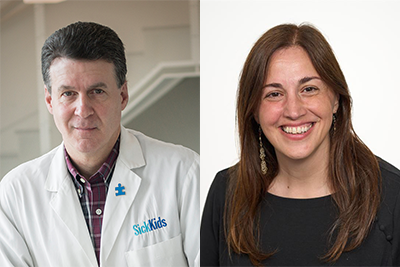Opinion: The truth of autism will continue to be found in science, not myth
Summary:
Research leaders from SickKids and Holland Bloorview challenge recent U.S. administration autism claims, reaffirming the need for evidence-based science over myth and misinformation.

In an opinion piece originally published in The Globe and Mail, Dr. Stephen Scherer, Chief of Research at The Hospital for Sick Children (SickKids), and Dr. Evdokia Anagnostou, Vice-President of Research at Holland Bloorview Kids Rehabilitation Hospital, address current U.S. administration claims on the causes and interventions for autism and emphasize the importance of evidence-based research. This op-ed follows recent statements from SickKids and Holland Bloorview.

The lack of a consistent, unifying explanation for the many causes of autism spectrum disorder (ASD), a neurodevelopmental condition with a strong genetic basis, has led to anguish for many families.
The recent firestorm of misinformation from the White House is a blow to science. The current U.S. administration has claimed that taking acetaminophen (Tylenol) during pregnancy causes autism, that vaccinations should be split over visits, and that leucovorin, a folate-derived medicine, can treat autism.
No new research was presented. Words like “feel” and “believe” replaced evidence. In the wake of e-mails flooding our inboxes searching for truth, we needed to respond.
First: there is little evidence to link autism and acetaminophen, the safest medication to treat fever/pain during pregnancy. Second: there is no reproducible connection between vaccines and autism. Third: leucovorin may show promise in improving speech in a subset of minimally verbal autistic children, but broad recommendations are premature.
Beyond these myths, historical misconceptions have blamed “refrigerator mothers” (the discredited concept that autism was the result of an emotionally distant parent), claimed autism only affects males, and promised miracle cures. None are true. Autism is lifelong and complex.
Accusations of inaction dismiss the relentless work of researchers around the world and, in partnership with autistic people and their families, the search for answers. Science has long been demystifying autism’s complexity.
Autism encompasses a range of neurodevelopmental conditions sharing social communication challenges and repetitive behaviours. Since 2007, subtypes have been grouped under ASD to reflect the diversity of challenges and abilities. Autism often co-occurs with other neurodevelopmental conditions (i.e. ADHD), mental health conditions (such as anxiety and/or depression), and physical health conditions (such as sleep issues or epilepsy).
The spectrum is broad and includes individuals with varied experiences and needs, from those with profound autism who face severe communication challenges and intellectual disability requiring daily support, to those viewing autism as part of their identity.
Genetic discoveries have provided some of the first tangible biological explanations behind autism. In our study of more than 4,000 families, 20 per cent of autism cases were linked to genetic causes, such as having only one copy of a brain-specific gene instead of two. Most of these genetic variations are not inherited and are more common in people with cognitive and/or communication challenges. Some are located on the X chromosome, helping to explain the 4:1 male-to-female ratio found in autism (females have a backup X chromosome).
There are now about 100 genes scientifically linked to autism, each explaining fewer than 1 per cent of cases. These have been endorsed globally for genetic testing for autistic children and those with related neurodevelopmental conditions. Rather than complicating the picture, these findings reveal shared biological pathways. Research shows these genes operate in networks that guide neuronal cells to develop connections and transmit information.
Guided by evidence-based biomedical research, dozens of novel medications are now in clinical trials, including some led by our hospitals. DNA testing deepens our understanding of autism and a diagnosis connects families to advocacy groups and sometimes precision treatments.
In those with low cerebral folate levels, leucovorin may be a precision treatment, but well-controlled clinical trials are needed to evaluate safety and efficacy.
Beyond genetics, we are still looking for environmental factors that may interact with genes to influence the likelihood of autism. Some candidates include premature birth, low birth weight, infections during pregnancy (e.g., rubella, preventable by vaccines), exposure to some antiepileptic drugs, gestational diabetes, and parental age at conception.
In Canada, about one in 50 children and youth are diagnosed with autism each year. Rising rates mostly reflect increased awareness, broader diagnostic criteria, more frequent screening and improved access to services – not a true surge in prevalence.
In the aftermath of misinformation and myth, what should our country do?
Canadian researchers have long led global science in neurodevelopment and autism, backed by governments, hospitals and philanthropists who trust evidence-based findings. Now is the time to double down on funding and our collective commitment to advancing research and supporting autistic individuals and their families.
Continuing investigations will uncover remaining genetic and environmental influences that likely converge on already known biological networks. Grounded in biology, not mythology, new therapeutic targets will emerge, addressing areas of prioritized challenges by autistic individuals and their families, to supplement and facilitate existing evidence-based interventions.
Supporting fundamental research will also unlock other unexpected entry points to the autism enigma. The truth of what autism is will continue to be found in science.
Read the original op-ed in The Globe and Mail.
Resources for families
AboutKidsHealth: Autism spectrum disorder Learning Hub
Learn how ASD is diagnosed and explore types of supports for your child.
Holland Bloorview: Autism Resources
Links to information and support for families from Holland Bloorview and elsewhere.

